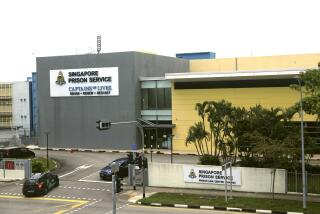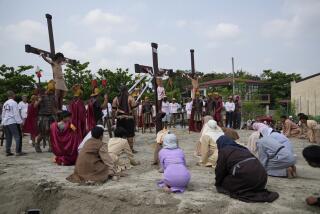Rapist’s Execution Is First in Philippines Since 1976
- Share via
BANGKOK, Thailand — The Philippines on Friday carried out its first execution in 23 years, killing by lethal injection a house painter convicted of raping his 10-year-old stepdaughter.
President Joseph Estrada, a former movie actor whose roles cast him as a tough guy with a soft heart, had said weeks ago that he would not grant clemency to Leo Echegaray, 38.
On Thursday, he cut the hotline from his office to Manila’s Bilibid Prison, saying: “They don’t have to wait for any call from me.”
Echegaray, who wore a badge on his orange uniform that said “Execute Justice, Not People,” was one of 915 inmates on death row--about half of them rapists. The Philippines, which had abolished the death penalty in 1987, restored it five years ago but didn’t carry it out until Friday. The last execution in the country was in 1976.
Human rights activists are concerned because, while more than half of the world’s countries have abolished the death penalty in law or in practice, nations in Southeast Asia are notable exceptions.
Almost all of the 10 member states of the Assn. of Southeast Asian Nations, or ASEAN, retain the penalty for a wide variety of crimes.
They range from “economic offenses” in Vietnam to piracy in Indonesia and unlawful possession of firearms in Brunei. Death sentences are most often carried out for drug trafficking, and travelers flying into Singapore and Kuala Lumpur, Malaysia, are reminded by attendants on the intercom that smoking in the terminals is permitted only in designated areas and that the penalty for drug possession is death.
Although Brunei is not known to have executed anyone since its independence from Britain in 1984, and Thailand has carried out only one execution since 1987, Amnesty International says Vietnam reported the execution of 185 people in 1995-96. Singapore put 82 people to death in the same period. The London-based human rights group says it fears that the actual figures were far higher in both countries.
Malaysia is known to have carried out 139 executions since 1990. In the past two decades, Indonesia has executed 39 people, including 30 political prisoners. Capital punishment has not been used since President Suharto was toppled last May after 32 years in power.
Cambodia, a new member of ASEAN, officially abolished the death penalty in 1989, a decade after the Khmer Rouge genocide that claimed more than a million lives.
The widespread use of capital punishment in Southeast Asia reflects the governmental authoritarianism that is still prevalent in the region, political analysts say, as well as people’s concerns about rising crime and drug use.
Although the powerful Roman Catholic Church opposes the death penalty--church bells pealed across Manila when Echegaray was declared dead--most Filipinos support it as a deterrent to crime, polls have shown.
Echegaray won a stay Jan. 4, just three hours before his scheduled execution, because the House of Representatives was reviewing the legality of the death penalty law.
Estrada led a campaign against the Supreme Court’s stay, and the House upheld use of the death penalty two weeks ago after a 10-hour debate.
“I’ve got to be firm, got to send a message to future rapists that we mean it,” Estrada said before Friday’s execution.
More to Read
Sign up for Essential California
The most important California stories and recommendations in your inbox every morning.
You may occasionally receive promotional content from the Los Angeles Times.












